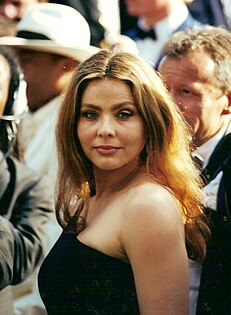
Ornella Muti is an Italian actress.
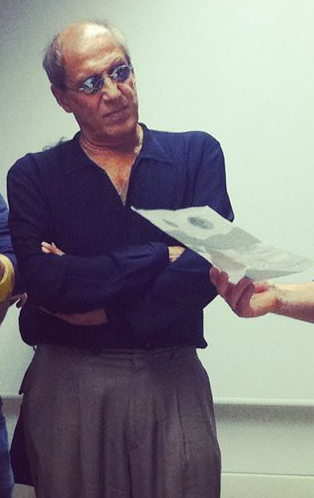
Adriano Celentano is an Italian musician, singer, composer, actor, and filmmaker. He is dubbed "il Molleggiato" because of his dancing.

Adolfo Celi was an Italian film actor and director. Born in Curcuraci, Messina, Sicily, Celi appeared in nearly 100 films, specialising in international villains. Although a prominent actor in Italian cinema and famed for many roles, he is best remembered internationally for his portrayal of Emilio Largo in the 1965 James Bond film Thunderball. Celi later spoofed his Thunderball role in the film OK Connery opposite Sean Connery's brother, Neil Connery.
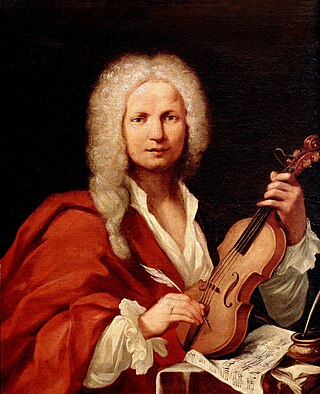
Orlando finto pazzo is an opera in three acts composed by Antonio Vivaldi to a libretto by Grazio Braccioli. The plot is based on an episode in Matteo Boiardo's unfinished epic poem Orlando Innamorato. The second of Vivaldi's known operas, Orlando finto pazzo premiered in November 1714 at the Teatro Sant'Angelo in Venice. Vivaldi acted as impresario as well as composer. Apparently the opera did not meet much approval from the audience and was billed only on few dates, just to be replaced, on 1 December, by a reworking of Giovanni Alberto Ristori’s Orlando furioso, an opera that the Vivaldi "impresa" had very successfully staged in 1713.
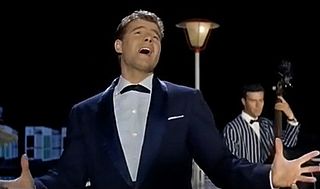
Joe Sentieri was an Italian singer and actor.

Di che segno sei? is a 1975 Italian comedy film directed by Sergio Corbucci, starring Alberto Sordi.
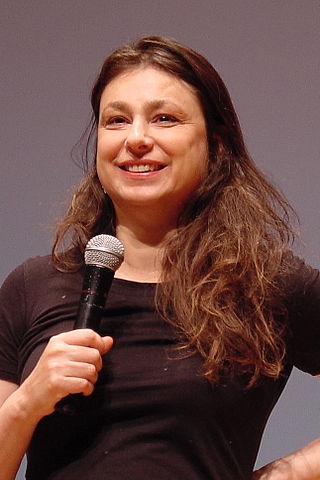
Francesca Archibugi is an Italian film director and scriptwriter.
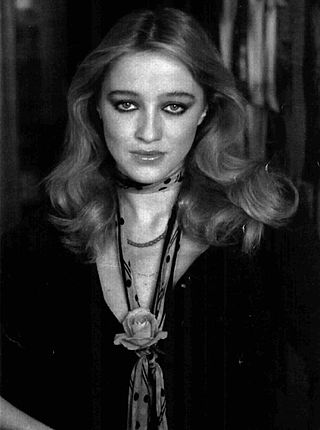
Eleonora Giorgi is an Italian actress.

Ragazzi del Juke-Box is a 1959 Italian "musicarello" film directed by Lucio Fulci and starring Mario Carotenuto, Elke Sommer and Anthony Steffen. Lucio Fulci has a cameo in the film as a festival organizer.

Claudia Mori, is an Italian producer, former actress and former singer, and wife of the singer Adriano Celentano.

Gino Santercole was an Italian singer/songwriter, guitarist, and actor. He was well known for his breakthrough hit "Questo vecchio pazzo mondo", a cover of P.F. Sloan's "Eve of Destruction," and for the song "Such a Cold Night Tonight" that he sang in the movie Yuppi Du.

Rita Rusić, also known as Rita Cecchi Gori, is a Croatian-born Italian producer, actress and singer. Rusic's career began as an actress with a major role in the 1982 film Attila flagello di Dio. She was eventually moved into the film industry, with Il pentito in 1982. Later that year she also began filming Joan Lui - Ma un giorno nel paese arrivo io di lunedì.
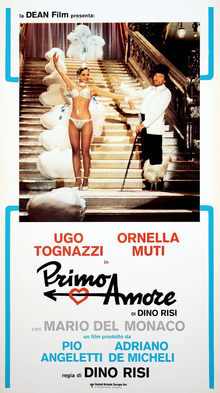
Primo amore, internationally released as First Love, is a 1978 Italian comedy-drama film directed by Dino Risi. For her performance Ornella Muti won a Grolla d'oro for Best Actress.

Il Bisbetico Domato is a 1980 Italian film directed by Franco Castellano and Giuseppe Moccia, credited as Castellano & Pipolo. The plot is loosely inspired by William Shakespeare's The Taming of the Shrew.

The musicarello is a film subgenre which emerged in Italy and which is characterised by the presence in main roles of young singers, already famous among their peers, and their new record album. In the films there are almost always tender and chaste love stories accompanied by the desire to have fun and dance without thoughts. Musicarelli reflect the desire and need for emancipation of young Italians, highlighting some generational frictions. The genre began in the late 1950s, and had its peak of production in the 1960s.

Nessuno è perfetto is a 1981 Italian comedy film directed by Pasquale Festa Campanile. The film was a great commercial success, grossing over 10 billion lire at the Italian box office. For her performance Ornella Muti won the Globo d'oro for best actress.
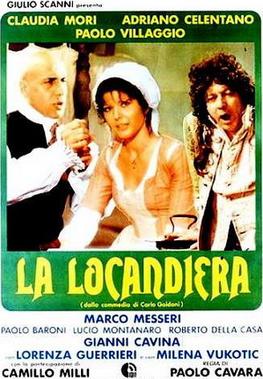
La locandiera is a 1980 Italian comedy film directed by Paolo Cavara, based on the Carlo Goldoni's three-act comedy The Mistress of the Inn.

Saturday, Sunday and Friday, originally titled Sabato, domenica e venerdì, is a 1979 Italian anthology comedy film directed by Castellano & Pipolo, Pasquale Festa Campanile and Sergio Martino.
Count Max is a 1991 French-Italian comedy film directed by Christian De Sica and starring De Sica, Ornella Muti and Galeazzo Benti. It is a remake of the 1957 film Count Max, which was itself a remake of the 1937 film Il signor Max. Both films had starred Christian De Sica's father Vittorio De Sica.

Civico zero is a 2007 Italian drama film written and directed by Francesco Maselli. It is inspired by the book Il nome del barbon of Federico Bonadonna.



















